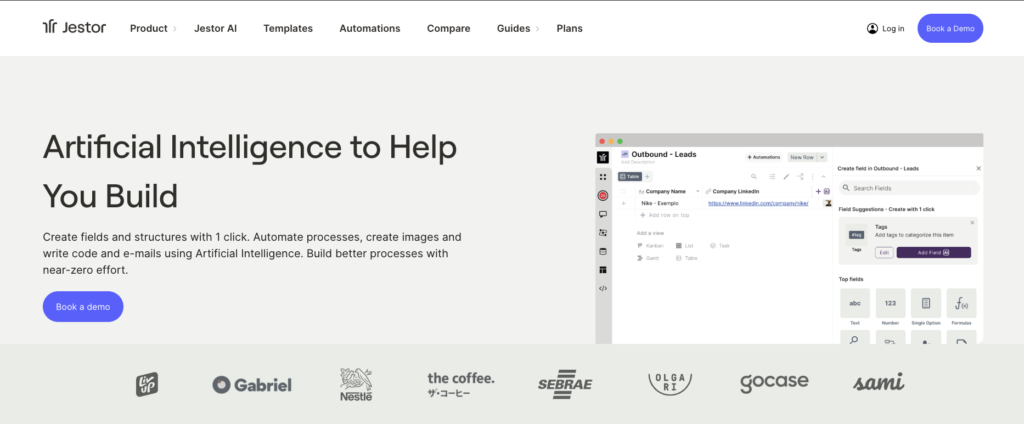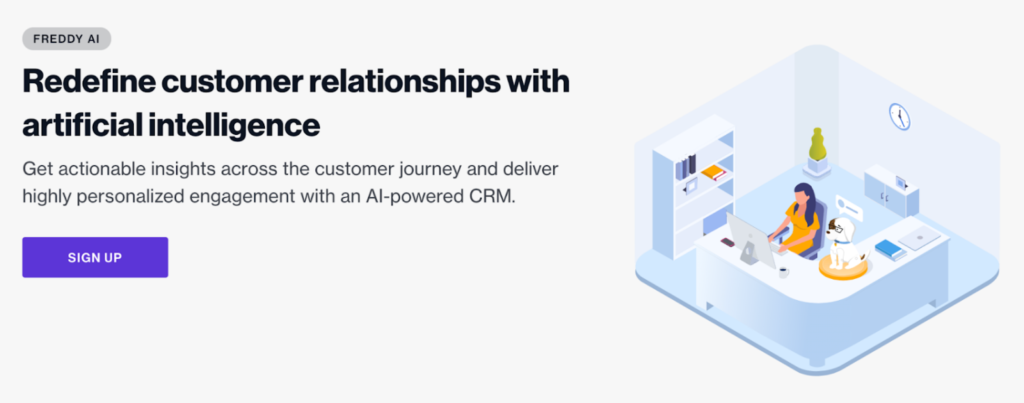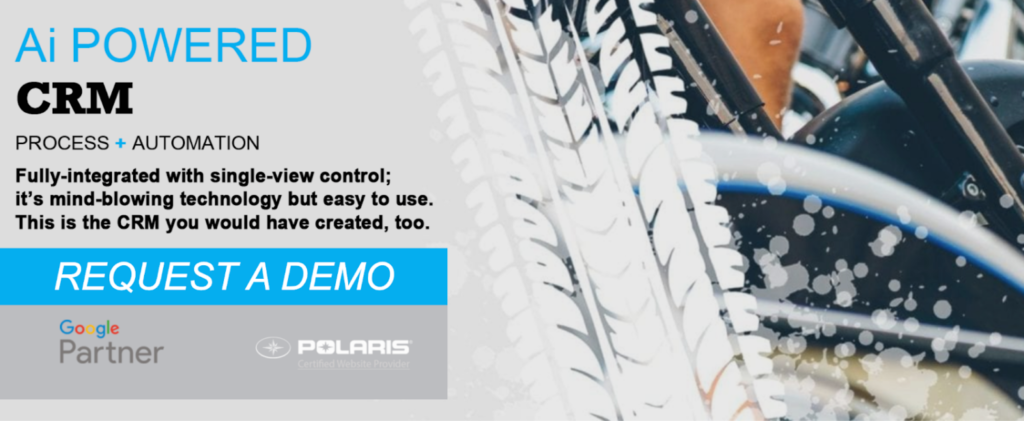Top Brands Leveraging AI-Powered CRM

Customer Relationship Management (CRM) is a powerful technique used by businesses to manage customer interactions throughout their entire relationship with a company. The CRM philosophy revolves around putting oneself in the customer’s shoes and understanding everything about them. To enhance this process further, businesses have started incorporating AI (Artificial Intelligence) into their CRM with AI platforms. AI-powered CRMs are transforming customer relationship management by enabling data-driven decision-making through real-time customer information analysis, revolutionizing the sales process.
What Are AI-Based CRMs?
AI-based CRMs are a set of AI-driven processes that centralize customer management, making it more efficient and effective, even with tens of thousands of customers. These CRM with AI operate on four core principles:
#1. Machine Learning
Machine Learning (ML) is a cutting-edge technique utilized in commercial AI. It involves training AI systems to perform efficiently under changing conditions by continuously monitoring patterns and trends over time rather than relying on rigid and coded instructions.
#2. Predictive Analysis
Predictive analysis is crucial for enterprise planning and customer interactions. AI-powered CRMs empower organizations to make data-driven decisions, forecast sales accurately, and allocate resources effectively at all levels.
#3. Automation
As the term suggests, AI-powered CRMs heavily rely on automation, making it an integral part of the entire process. Automation enhances the CRM’s capabilities by performing tasks with greater speed and accuracy than humans. With advancements in AI, even complex workflows can be automated effortlessly.
#4. Sentiment Analysis
One of the significant advantages of AI-powered CRMs is their ability to capture, analyze, and visualize how customers perceive products and services. This feature allows customer service and sales agents to identify emotions such as satisfaction and frustration across various communication channels, including phone, live chat, email, and social media.
AI-powered CRMs encompass other elements that contribute to overall customer engagement improvements. Let’s delve into how AI-based CRMs enhance customer engagement:
How AI-Based CRMs Can Improve Customer Engagement
A study by Harvard Business Review titled ‘How AI Is Changing Sales‘ indicates that AI algorithms can significantly impact five core areas of sales:
- Competitive Pricing
- Forecasting
- Upselling & Cross-selling
- Lead Scoring
- Performance Management
The integration of AI with Customer Relationship Management software provides comprehensive insights into these areas, resulting in higher conversion rates.
#1. Personalization
AI-powered CRMs help businesses personalize customer interactions by analyzing customer data, such as past purchase history, browsing behavior, and demographics. Utilizing this data, marketing messages, product recommendations, and customer support interactions can be tailored to each customer’s unique needs and preferences.
#2. Chatbots
AI-powered CRMs utilize chatbots to provide instant customer support and improve response times. Chatbots can handle frequently asked questions, offer product recommendations, and process simple transactions, thus speeding up the process and freeing human agents to address more complex issues.
#3. Omnichannel Support
AI-powered CRMs enable seamless customer support across multiple channels, such as email, social media, chat, and phone. Customers can interact with businesses through their preferred channel, leading to improved engagement and overall satisfaction.
In summary, AI-enabled CRM software can analyze customer emotional states through text-based or voice-based interactions, enabling businesses to create personalized experiences and interactions for each customer.
Benefits of Integrating AI In CRM
In today’s fast-paced business landscape, the integration of Artificial Intelligence (AI) with traditional Customer Relationship Management (CRM) software has become a game-changer for companies seeking to boost efficiency, improve customer interactions, and optimize their sales processes. This powerful combination offers a wide array of advantages that can lead to enhanced productivity and increased revenue. Let’s explore some of the key benefits of integrating AI in CRM:
1. Improve Efficiency
By combining AI and CRM, businesses can transform their conventional CRM software into an all-in-one virtual assistant. AI brings automation and intelligence to various manual tasks, such as managing calendars, planning meetings, making phone calls, and following up with customers. This frees up valuable time for sales and customer service executives, enabling them to focus on more strategic and high-value tasks like building customer relationships and optimizing the sales funnel.
2. Helps In Customer Segmentation
One of the most significant advantages of AI-powered CRMs is their ability to streamline the process of customer segmentation. Traditionally, manual customer segmentation based on demographics, behavior, likes, and dislikes can be laborious and time-consuming. However, with the powerful algorithms of AI-powered CRMs, this process becomes effortless and efficient.
Automating customer segmentation not only saves time but also enables businesses to create personalized marketing messages and experiences for potential customers. The more targeted the marketing efforts, the higher the chances of generating valuable leads and conversions.
3. Simplify Lead Management
Managing thousands of leads each month can be overwhelming, and manually sifting through them is not practical. AI-powered CRMs offer a solution by creating a lead-generation powerhouse that can handle large volumes of leads without compromising the quality of interaction. The combination of AI and CRM allows businesses to engage, nurture, qualify, and follow up with leads effectively, increasing the chances of converting leads into sales.
4. Close More Deals
AI-powered CRMs provide a significant advantage in analyzing and identifying leaks in the sales pipeline. These systems use AI algorithms to gain insights into buyer intent, helping sales representatives make intelligent recommendations for closing deals. Additionally, in time-sensitive situations, AI-powered CRMs can provide instant reports and customer sentiment analysis, enabling businesses to respond promptly and effectively to potential leads.
Drawbacks of AI-Based CRMs
While the integration of AI in CRM offers numerous benefits, it is essential to acknowledge some drawbacks that businesses should consider:
1. Data Biased
AI-powered CRMs rely on data collected from various channels and campaigns. If the data is biased or incomplete, the algorithms may produce inaccurate or unfair results. Ensuring a diverse and representative dataset is crucial to avoid biased AI outcomes.
2. Lack of Human Interaction
While automation can save time and reduce costs, excessive reliance on AI-powered systems can lead to a lack of human interaction with customers. This can negatively impact the customer experience, as some customers may prefer speaking to a human representative for more personalized support.
3. Cybersecurity Risks
Integrating CRM with AI can introduce potential cybersecurity risks. AI-powered systems may be vulnerable to cyber attacks, making it crucial for businesses to implement robust security measures to protect sensitive customer data.
Top Brands That Leverage AI-Powered CRMs
According to the 2020 marketing leadership benchmark report, marketing leaders leverage AI to improve customer segmentation and lookalike audience modeling. In this article, we will explore how top brands are harnessing the power of AI-powered CRMs to enhance their marketing efforts and drive business growth. Let’s delve into some compelling use cases that demonstrate the effectiveness of AI in CRM.
1. Coca-Cola
Coca-Cola, one of the largest beverage companies globally, recognized the importance of serving its vast customer base efficiently. To enhance its marketing strategies and provide better customer experiences, Coca-Cola implemented an AI-powered CRM system. By leveraging this system, the company gained valuable insights into customer behavior and preferences. These insights enabled Coca-Cola to create targeted marketing campaigns that resonated with its audience effectively. Moreover, the CRM with AI system helped identify areas for improving customer service, leading to increased customer satisfaction.

2. Salesforce
Salesforce, a leading CRM software provider, understands the significance of AI in delivering exceptional value to its customers. Salesforce’s Einstein AI, powered by natural language processing and machine learning algorithms, empowers sales teams to gain a deeper understanding of their customers and uncover new opportunities. By leveraging AI, companies using Salesforce have experienced increased sales and improved customer satisfaction.

3. Cogito
Cogito, a company specializing in conversational analysis, leverages AI-powered CRMs to evaluate customer emotions and the effectiveness of calls. By understanding customers’ emotional states, businesses can tailor their responses to meet their needs effectively. Cogito’s AI-powered CRM has shown that comprehending customer emotions can lead to a 10% increase in revenue per customer.

AI-Powered CRM Solutions
Now that we have explored how top brands leverage AI-powered CRMs, let’s take a look at some Software-as-a-Service (SaaS) solutions in this sector that offer advanced functionalities and benefits.
1. Jestor
Jestor is a highly versatile All-in-One AI-Powered CRM and Workflow automation database platform designed to automate sales, marketing, HR, Finance, customer support processes for businesses of all sizes. It offers a drag-and-drop interface and a wide range of pre-built fields and components to customize and build your unique workflows. It aims to provide a centralized platform for teams to plan, execute, and monitor their processes effectively.

2. Freddy AI
Freddy AI by Freshworks is an AI-powered CRM tool with features such as chatbots, predictive lead scoring, and intelligent workflows, Freddy AI streamlines various CRM tasks. Businesses can track and measure their sales and customer service performance in real-time through customizable dashboards and reports. Additionally, Freddy AI integrates seamlessly with other tools like Freshdesk, Freshsales, and Google Analytics, providing a comprehensive view of customer data.

3. C3 AI
C3 AI CRM is a next-generation customer relationship management platform that harnesses the power of artificial intelligence to drive business growth. This tool offers a unified view of customer data, allowing businesses to gain a 360-degree understanding of their customers. With a 97% revenue forecast accuracy, C3 AI CRM helps organizations identify, prioritize, and accelerate the right deals. The platform also offers a dedicated mobile app for tracking performance and conversions on the go.

4. Kreato CRM
Kreato CRM is a cloud-based customer relationship management platform tailored for small to mid-sized businesses. Powered by built-in Sales Acceleration AI – Axlerate, Kreato CRM offers features like lead scoring, sales forecasting, activity capture, engagement recommendations, and team performance insights. The user-friendly interface and customizable dashboards make it easy for businesses to manage customer data and track performance in real-time.

5. PSXDigital CRM
PSXDigital provides an AI-powered CRM solution designed to automate sales and marketing activities. The platform offers high customization to cater to the needs of organizations across various industries. By integrating PSX Digital with existing CRM software, businesses can perform in-depth analysis of customer data on the go. The platform aggregates data from multiple customer, market, and historical sources, providing valuable insights in a single view. This enables smarter decision-making and meeting customer expectations more effectively.

Wrapping Up
The combination of AI and CRM has revolutionized the sales and marketing outlook in today’s era. While some organizations may perceive AI-powered CRMs as unnecessary, they fail to realize the immense value it brings to streamlining sales processes and enhancing customer experiences. With the use of AI-powered CRMs, companies can gain a deeper understanding of their customers, create targeted campaigns, and improve overall customer satisfaction.
FAQs about AI-Powered CRM
1. How can AI-powered CRMs benefit businesses?
AI-powered CRMs provide valuable insights into customer behavior, enabling businesses to create targeted marketing campaigns and improve customer service. They streamline sales processes, identify new opportunities, and increase revenue per customer.
2. Which brands have successfully leveraged AI-powered CRMs?
Top brands like Coca-Cola and Salesforce have implemented AI-powered CRMs to enhance their marketing efforts, improve customer experiences, and drive business growth.
3. What features can businesses expect from AI-powered CRM solutions?
AI-powered CRM solutions offer various features such as automation, chatbots, predictive lead scoring, intelligent workflows, customizable dashboards, and real-time performance tracking.
4. Are there AI-powered CRM solutions suitable for small to mid-sized businesses?
Yes, CRM solutions like Kreato CRM are specifically designed for small to mid-sized businesses. They offer user-friendly interfaces, customizable dashboards, and AI-powered features tailored to their needs.
5. How does AI contribute to revenue forecasting accuracy?
AI analyzes vast amounts of customer data, historical trends, and market insights to provide accurate revenue forecasts for businesses, sales teams, and specific geographies. This helps organizations make informed decisions and identify opportunities for growth.

